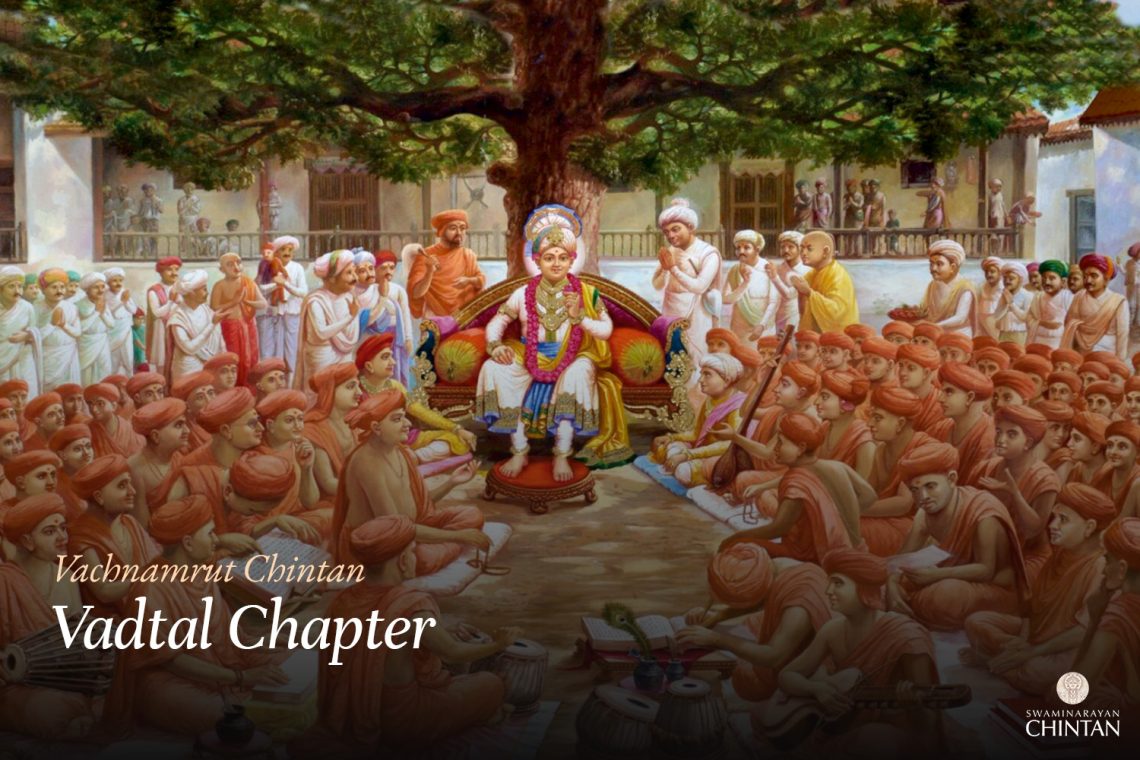Central Insights:
- Righteousness and unrighteousness.
Key Points:
- Those vimukh (faithless) souls who are thought to be righteous are not actually righteous, and those who are thought to be sinners are not necessarily sinners.
- Only those who bear enmity towards the Satpurush (True Saint) are truly unrighteous, while those who revere the qualities of the Satpurush are the most righteous.
Explanation:
In this Vachanamrut, Ramchandraji Vaghmodia of Vadodara posed a question to Shreeji Maharaj, “Maharaj, what is the reason that even an unworthy soul can go into samadhi (trance)?”
The background of this question involves an incident: A certain pious person’s life had deteriorated considerably. They had abandoned their varna-ashram dharma (duties according to varna and ashram) and were completely absorbed in violence and debauchery, residing in the wilderness near the Vishwamitri River. Swaminarayan santo were traveling for satsang as per Maharaj’s command, and during the cold season, one of the santo became severely cold, and their body began to fail. This person helped the sant recover from the cold, thereby saving their life. Impressed by the sant’s lifestyle, they began to respect them and heard from the sant about Maharaj’s presence in Vadtal and were encouraged to go for darshan (holy viewing).
This person came to Vadtal and saw the ongoing work at the temple, where even great santo like Brahmanand Swami were laboring for the temple’s construction. Witnessing this, he felt immense reverence for them. When he finally had darshan of Maharaj, he instantly went into samadhi. Ramchandraji observed that although this person was not living by varna-ashram and proper conduct, they experienced samadhi, while many worthy and virtuous individuals do not. So, he asked, “Why do some unworthy souls go into samadhi, while many pious and righteous souls do not?”
Maharaj then explained that as prescribed in the dharm shastras (scriptures on righteousness), varna-ashram dharma includes the duties of bathing, cleanliness, respect for family customs, sacrifices, charity, and austerities. When someone fails to observe these dharmas, people consider them unworthy. However, if such a so-called unworthy person develops genuine admiration for the virtues of Bhagwan or His sant (saints who live solely for God’s purpose), a divine stock of merits manifests within them. The sins they accrued through neglect of varna-ashram duties are completely eradicated, and their soul becomes supremely pure, thus attaching itself to Paramatma (Supreme God), enabling them to experience samadhi.
On the other hand, if someone diligently observes renowned sacrifices, charity, and virtuous actions but harbors enmity toward Bhagwan and His satpurush (true saint), the sin they incur from this enmity burns up all the merits earned by their dharmic actions. As a result, even in favorable circumstances, their soul does not attach itself to God. Thus, Maharaj explains that one who bears enmity toward a satpurush is more sinful than one who has committed the five grave sins, for the latter still has some potential to attain God. But one who bears enmity towards the satpurush has no chance of ever connecting with Bhagwan, for which no greater sin exists. Such a person is the greatest sinner because this sin obstructs the soul from merging with the Supreme God. Regardless of their actions, anyone who seeks refuge under a satpurush is purified and can attain samadhi. Yet one who bears enmity towards a satpurush is a profound sinner, no matter how righteous they may appear.
Thus, Shreeji Maharaj concludes, “A vimukh soul, whom the faithless may consider a sinner, is not necessarily sinful. Similarly, one whom they consider righteous is not necessarily righteous. Only those who have reverence and respect for a satpurush in their heart are truly righteous and pure. Those who harbor disrespect for the satpurush are the most sinful, impure, and unworthy of respect.”
Glossary
| Vimukh – One who turns away from God & His Devotees A person who distances themselves from devotion and Satsang. |
| Satpurush – A true saint or spiritual guide |
| Varna-Ashram Dharma – Duties by caste and stage of life A framework for living a disciplined and righteous life as per one’s role and responsibilities. |
| Satsang – Holy fellowship |
| Samadhi – Deep meditative state A state of deep, focused meditation, where the body remains unconscious and the mind is absorbed in God and divine experience |
| Paramatma – Supreme God God, the all-pervading and ultimate reality. |
| Dharm Shastras – Scriptures on righteousness Sacred texts that define the moral and spiritual duties of individuals, guiding them on how to live a righteous life in accordance with divine will. |
| Enmity – Hostility or opposition |
| Vairagya – Detachment From Everything Except God |
| Purification – Spiritual cleansing The process of cleansing the soul of past sins and impurities through devotion, reverence for Bhagwan, and service to His saints, enabling it to experience samadhi and divine realization. |
| Divine Stock of Merits – Accumulated spiritual good deeds The accumulated spiritual merits earned by actions aligned with dharma (righteousness), which purify the soul and bring it closer to Bhagwan when guided by a Satpurush. |
| Karma – Action The deeds performed by a Jeev, which determine its future experiences based on the law of cause and effect. |
| Sharanagati – Surrender or Refuge The act of completely surrendering to God with no other means or protectors, ensuring liberation. |
| Samadhi Induction – The process of entering samadhi |

